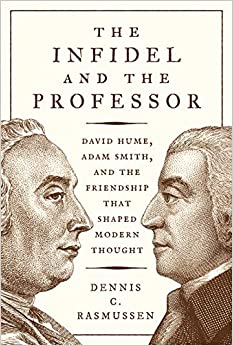Richard McDonough
Dennis C. Rasmussen: The Infidel and the Professor
Reviewed by Richard McDonough

Dennis C. Rasmussen has produced an excellent account of “the greatest of all philosophical friendships” between two of the great thinkers of the underappreciated “Scottish Enlightenment”, Adam Smith, Chair of Moral Philosophy at the University of Glasgow who, in his The Wealth of Nations, is often seen as the founder of capitalism and creator of the modern science of economics, and David Hume, who never became an academic but who took “British Empiricism” to its logical sceptical conclusion and is often seen as the most influential philosopher ever to write in the English language.
The book covers the span between Smith’s and Hume’s first meeting in 1749 until Smith’s eulogy upon Hume’s death in 1776. It describes how they commented on each other’s work, supported each other’s careers and literary ambitions and advised each other on personal issues. They had many of the same friends, joined the same clubs, and were interested in many of the same subjects beyond philosophy, including psychology, history, politics and Britain’s conflict with the American colonies.
Each chapter focuses on an historical episode and theme, beginning with an introduction to Hume and his works (Chap. 1), Smith’s discovery of Hume’s writings and acquaintance with Hume (Chap. 2), their developing friendship (Chap. 3), Hume’s conflict with the Church of Scotland (Chap. 4), Smith’s work on The Theory of Moral Sentiments (Chap. 5), Hume’s fruitful sojourn in France (Chap. 6), Hume’s friendship and eventual conflict with the moody paranoid Swiss philosopher Jean-Jacques Rousseau (Chap. 7), the last years of Hume’s and Smith’s friendship (Chap. 8), Smith’s publication of An Inquiry into the Nature and Causes of the Wealth of Nations (Chap. 9), the dispute over Smith’s reluctance to publish Hume’s Dialogues Concerning Natural Religion (Chap. 10), Hume’s final days (Chap. 11), Smith’s Eulogy to Hume (Chap. 12), and Smith’s final years in Edinburgh (Epilogue).
Rasmussen brings out the contrast between Hume and Smith both in their writings in their public persona. Whereas Smith, known as a deist, was the widely respected professor at the University of Glasgow for more than a decade, Hume was seen as “the great Infidel” for his sceptical philosophy and irreligious irreverence. Rasmussen shows that the two philosophers were close both personally and intellectually but that they had some serious differences, especially about the place of Christianity in society. However, Rasmussen also reveals, intriguingly, that Smith’s private religious views were closer to Hume’s public ones than is commonly believed and that Smith contributed more to philosophy than is generally appreciated.
The book also helps to explain why the “Scottish Enlightenment” developed differently, both intellectually and politically, from the “French Enlightenment”. Whereas French Enlightenment figures were often disaffected intellectuals at war with establishment elites in society, the Scottish “literati” were often “widely admired and deeply engaged members of their communities” (p. 8), which helps to explain why a deep “conservatism,” reflected in both Smith’s and Hume’s works, characterizes the Scottish Enlightenment.
One might complain that Rasmussen gives more time to Hume than to Smith but this is probably inevitable since very little is known about Smith’s personal life and beliefs because he wrote relatively few letters, had almost all of his remaining manuscripts burned by his literary executors, and was generally more guarded in expressing opinions on certain topics than Hume.
One might also complain that Rasmussen spends far more time on the biography of the two thinkers than he does on intellectual ideas. First, however, there are interesting remarks on the intellectual ideas of the two thinkers, especially in chapters devoted to their works. Second, if there is a greater emphasis on the biographies rather than their ideas, this is because Rasmussen’s primary aim is to understand the very unique kind of friendship between the two towering Enlightenment figures that helped each of them to produce their various intellectual ideas.
Rasmussen’s book should be of great interested to anyone interested in the development of modern economic thought, specifically, political economy and classical liberalism. He has done an excellent job unearthing little known stories and correspondence and woven them together with events in Hume’s life in an illuminating way. The book is clear and well written. Rasmussen presents evidence and evaluates controversies and questions concerning the relationship between Smith and Hume and with others in a judicious informed way. Since the book is well documented with extensive footnotes it should be of great use both to beginners who just want an introduction to this important part of Scottish history and to experts who wish to develop a greater understanding of the relationship between Smith and Hume. Finally, it should be of great interest to anyone interested in the philosophical background of many of the globalist ideas in modern commercial society.
Dennis C. Rasmussen: David Hume, Adam Smith, and the Friendship that Shaped Modern Thought. Princeton: Princeton University Press, 2017: pp. xiv, 316. Richard McDonough has a B.A. in philosophy from the University of Pittsburgh and a Ph.D. in Philosophy from Cornell. He has authored several books and numerous articles on philosophy, psychology and linguistics.
Richard McDonough has a B.A. in philosophy from the University of Pittsburgh and a Ph.D. in Philosophy from Cornell. He has authored several books and numerous articles on philosophy, psychology and linguistics.
Back to Meridian 3

